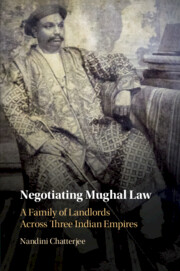
-
Select format
-
- Publisher:
- Cambridge University Press
- Publication date:
- 27 March 2020
- 16 April 2020
- ISBN:
- 9781108623391
- 9781108486033
- 9781108736961
- Creative Commons:
-
This content is Open Access and distributed under the terms of the Creative Commons Attribution licence CC-BY-NC-ND 4.0.
https://creativecommons.org/creativelicenses - Dimensions:
- (228 x 152 mm)
- Weight & Pages:
- 0.62kg, 310 Pages
- Dimensions:
- (229 x 152 mm)
- Weight & Pages:
- 0.45kg, 312 Pages
- Subjects:
- Legal History, Area Studies, South Asian History, Law, Asian Studies, History
Open AccessYou have digital access to this book- Subjects:
- Legal History, Area Studies, South Asian History, Law, Asian Studies, History
Book description
Based on a completely reconstructed archive of Persian, Hindi and Marathi documents, Nandini Chatterjee provides a unique micro-history of a family of landlords in Malwa, central India, who flourished in the region from at least the sixteenth until the twentieth century. By exploring their daily interactions with imperial elites as well as villagers and marauders, Chatterjee offers a new history from below of the Mughal Empire, far from the glittering courts of the emperors and nobles, but still dramatic and filled with colourful personalities. From this perspective, we see war, violence, betrayal, enterprise, romance and disappointment, but we also see a quest for law, justice, rights and righteousness. A rare story of Islamic law in a predominantly non-Muslim society, this is also an exploration of the peripheral regions of the Maratha empire and a neglected princely state under British colonial rule. This title is also available as Open Access.
Reviews
‘This book is an important work that enriches our understanding of family, empire and estate in South Asia. The analysis moves away from state policy and image-building to the micro-processes that actually reproduce state power. It achieves this through the mastery of difficult sources presented in a wide comparative frame.'
Sumit Guha - University of Texas, Austin
‘In tracking a single family's legal documents over three centuries, Nandini Chatterjee has written an extraordinary book, upturning our understanding of how Mughal law worked and how it was experienced by its subjects. It will be revelatory for anyone interested in Islamic, South Asian, or Mughal history.'
Samira Sheikh - Vanderbilt University
‘… it will be a valuable addition to the historiography of the Mughal Empire.’
P. P. Barua Source: Choice
Contents
Full book PDF-
Negotiating Mughal Law
pp i-ii -
-
- You have access
- Open access
- HTML
- Export citation
-
-
Negotiating Mughal Law - Title page
pp iii-iii - A Family of Landlords across Three Indian Empires
-
-
- You have access
- Open access
- HTML
- Export citation
-
-
Copyright page
pp iv-iv -
-
- You have access
- Open access
- HTML
- Export citation
-
-
Contents
pp v-v -
-
- You have access
- Open access
- HTML
- Export citation
-
-
Figures and Tables
pp vi-vi -
-
- You have access
- Open access
- HTML
- Export citation
-
-
Maps
pp vii-vii -
-
- You have access
- Open access
- HTML
- Export citation
-
-
Acknowledgements
pp viii-x -
-
- You have access
- Open access
- HTML
- Export citation
-
-
Note on Transliteration and Dates
pp xi-xi -
-
- You have access
- Open access
- HTML
- Export citation
-
-
Abbreviations
pp xii-xii -
-
- You have access
- Open access
- HTML
- Export citation
-
-
Introduction: Law in Many Forms
pp 1-43 -
-
- You have access
- Open access
- HTML
- Export citation
-
-
1 - Malwa: Land of Many Empires
pp 44-69 -
-
- You have access
- Open access
- HTML
- Export citation
-
-
2 - Zamīndārs: Lords of the Marches
pp 70-112 -
-
- You have access
- Open access
- HTML
- Export citation
-
-
3 - Contractors: Engaging the State
pp 113-140 -
-
- You have access
- Open access
- HTML
- Export citation
-
-
4 - Transactions: Recording Deals
pp 141-170 -
-
- You have access
- Open access
- HTML
- Export citation
-
-
5 - Disputes: Judges and Courts
pp 171-190 -
-
- You have access
- Open access
- HTML
- Export citation
-
-
6 - Invaders: Marathas and the British
pp 191-210 -
-
- You have access
- Open access
- HTML
- Export citation
-
-
7 - Identity: Professionals or Warlords?
pp 211-223 -
-
- You have access
- Open access
- HTML
- Export citation
-
-
Fragments to Archives: a Methodological Manifesto
pp 224-238 -
-
- You have access
- Open access
- HTML
- Export citation
-
-
Appendix: A Catalogue of the P Das Archive
pp 239-266 -
-
- You have access
- Open access
- HTML
- Export citation
-
-
Glossary
pp 267-268 -
-
- You have access
- Open access
- HTML
- Export citation
-
-
Bibliography
pp 269-290 -
-
- You have access
- Open access
- HTML
- Export citation
-
-
Index
pp 291-298 -
-
- You have access
- Open access
- HTML
- Export citation
-
Metrics
Altmetric attention score
Full text views
Full text views help Loading metrics...
Loading metrics...
* Views captured on Cambridge Core between #date#. This data will be updated every 24 hours.
Usage data cannot currently be displayed.
Accessibility standard: Unknown
Why this information is here
This section outlines the accessibility features of this content - including support for screen readers, full keyboard navigation and high-contrast display options. This may not be relevant for you.
Accessibility Information
Accessibility compliance for the PDF of this book is currently unknown and may be updated in the future.


